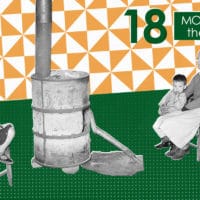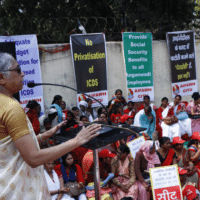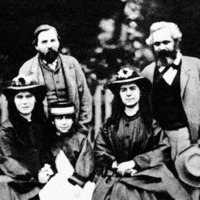-
Capitalism & the home
We have become used to ‘stay at home’ in the corner of our TV screens, behind nightly government press conferences, repeated over and over on the radio and in social media.
-
Engels was right, class society and women’s oppression aren’t inevitable or irreversible
There is a view of human history which holds effectively that there is little difference in essentials between modern, capitalist society and the societies of the past.
-
“Hair” @WANPOETRY
Tova Charles & Zai Sadler performing “Hair” at Write About Now Poetry.
-
Media fail to identify xenophobia as Biden says Trump ‘rolled over for Chinese’
Rather than respond by focusing blame for the crisis squarely where it belongs—on Trump’s incompetent, reckless and self-centered management—and working to beat back the dangerously rising anti-Asian sentiment in this country, Biden and some of his supporting super PACs are choosing to adopt rather than challenge the anti-China premise of the attacks.
-
Femicide does not respect the quarantine
Days, weeks, months, an indeterminate amount of time as the world seems paralysed by the journey of SARS-CoV-2. The lack of certainty increases the anxiety. This virus, as Arundhati Roy writes, ‘seeks proliferation, not profit, and has, therefore, inadvertently, to some extent, reversed the direction of the flow [of capital].
-
Re-enchanting the world: Silvia Federici on feminism and the politics of the commons
In her recent volume Re-enchanting the World: Feminism and the Politics of the Commons (PM Press, 2019), Silvia Federici fruitfully brings together feminist reflections with discussions of the commons as a possible way of overcoming capitalism.
-
We who were nothing and have become everything shall construct a new and better world
On 8 March 1917 (23 February by the old Julian calendar), a hundred women in the textile factories in Petrograd decided to go on strike; they went amongst the other factories and called their fellow workers onto the streets. Before long, around 200,000 workers–led by the women–marched through the streets.
-
Why does Little Women still matter? Review of Little Women (2019) – Directed by Greta Gerwig
Greta Gerwig’s new adaptation of Little Women has struck a resounding chord with audiences, particularly young women. Why does this book continue to resonate with us one hundred and fifty years later, and what did this latest version bring us?
-
How women shake up the political world
The originality of the Haitian feminist movement lies in the fact that it can be thought of neither in terms of a wave (first, second or third) nor in terms of a defined current (liberal, black, decolonial, etc.).
-
For Mabel Lee, a pioneer for suffrage, some recognition at last
Not all US women were given the right to vote in 1920, despite leading courageous efforts to widen the franchise.
-
The vanguard of Chavism has a woman’s face: A chronicle of their resistance in 2019
In the middle of the year, we Venezuelans received a visit from the UN High Commissioner for Human Rights, Michel Bachelet, on the occasion of meeting with the different political actors in the country to “evaluate” the complex economic and social environment brought about by the White House’s decision.
-
The oppressive state is a macho rapist
On 25 November 1960, three of four of the Mirabal sisters – María Teresa, Minerva, and Patria – of the Dominican Republic were assassinated for their resistance against the dictatorship of Rafael Trujillo. The youngest of the three – María Teresa – said before her death, ‘Perhaps what we have most near is death, but that idea does not frighten me. We shall continue to fight for justice’.
-
Thinking and acting from Marxism today – Feminist proposals for a theoretical and strategic rearmament
The global disorder and the experiences of the systemic crisis we have experienced for more than a decade (economic crisis, crisis of political legitimacy, crisis of social reproduction and crisis of the limits of the planet) have generated a need to understand that cannot be covered by partial analyses but requires a theory of totality.
-
The human cost of nuclear weapons is not only a “feminine” concern
The nuclear weapons world is full of subtle and not-so-subtle misogyny, and I’ve had my share of experiences: Fighting my way onto an otherwise all-male panel, only to have my speaking time cut short. Meeting a male colleague at a conference for the first time, where he immediately told me that he liked the red […]
-
Socialist feminism and the Communal State
Blanca Eekhout is the Minister of People’s Power for the Communes and Social Movements of Venezuela and a woman linked to revolutionary militancy long before President Hugo Chávez came to power, whose team she was part of.
-
No Depression in Heaven with Alison Collis Greene
In this episode of Money on the Left, we speak with historian Alison Collis Greene about her book No Depression in Heaven with an eye toward contemporary debates around the Green New Deal. Subtitled The Great Depression, the New Deal, and the Transformation of Religion in the Delta, Greene’s book critiques what she calls the […]
-
Navigating Educational Empowerment Through Life Conditions: A Study of Rural Women in Indian Punjab
Though the voices of rural women in India are some of the least heard, they are not mere passive victims. Many rural women strongly condemn their marginalization and pauperization—highlighting the flawed and biased developmental polices of the state, which they hold largely responsible for their hardships.
-
The commodity and the making of “woman”
If we have little interest in the scholasticism and the baroque arcana of contemporary marxist theoretical debates, the wealth of marxist theory can be neither dismissed nor ignored. And debates around marxist inspired feminism are a case in point.
-
Women’s museums give voice to silenced histories
They can be a force for change, explains Rachel Thain-Gray
-
Gossip girls
In her landmark Caliban and the Witch, Marxist scholar Silvia Federici argues that witch hunts were an organized campaign of mass murder of women–particularly low-class women, midwives, or “wise women”–who defied the increasing implementation of a patriarchal, authoritarian order under a rapidly developing capitalist state.




















